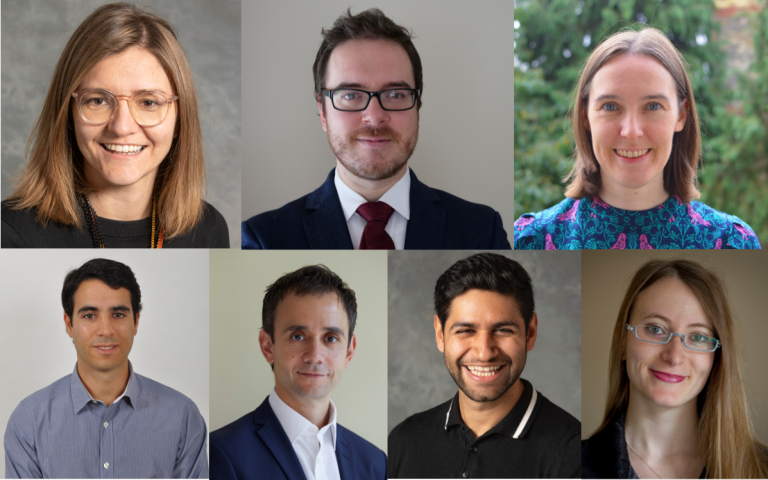UCL academics named as Future Leaders Fellows
15 October 2020
Seven UCL academics have been awarded prestigious UKRI Future Leaders Fellowships, and will receive government investment to support their research.

UCL has also been chosen to be one of seven institutions which make up the Future Leaders Fellowships (FLF) Development Network, which will provide training and development to the 210 new Fellows and 40 early career researchers and innovators.
The £2.8 million contract was awarded by UK Research and Innovation (UKRI) to the university following a competitive tender process. The programme is funded for three years.
The other six institutions which make up the network are: The University of Edinburgh, The University of Cambridge, Cardiff University, the University of Leeds, the School of Advanced Study, and Queens University Belfast.
The Network will focus on five areas: enterprise and self-leadership; leading teams and collaborations; transforming research cultures; contributing to UK society; and global citizenship.
Fellows will be offered a range of opportunities including structured workshops and events, coaching, and networking with industry and researchers, mentoring. They will also receive leadership and peer review training, engagement support, and international research encounters.
In addition, a funding stream has been created to help initiate and grow the groups’ collaborative ideas that will develop as Fellows start working and learning together.
The fellowships themselves are designed to identify and nurture the research leaders of tomorrow and support them in their academic careers.
Each fellow is provided with longer-term support, enabling them to explore complex problems and establish new research teams. UCL has so far been awarded 30 fellowships.
The seven UCL academics are:
Dr Valentina Cambiano (UCL institute for Global Health); for her work contributing to the end of HIV in Zimbabwe by focusing on 2 crucial elements: HIV testing and Pre-Exposure Prophylaxis among adolescent girls and young women, using a multidisciplinary approach.
Dr Charles-Antoine Collins-Fekete (UCL Medical Physics & Biomedical Engineering); for his work on outcome prediction through artificial intelligence to improve the prognosis of lung cancer patients. He is passionate about the possibilities of next-generation medical imaging to provide accurate quantitative information for personalized medicine.
Dr Gwyneth Davies (UCL GOS Institute of Child Health); for her work combining clinical informatics with novel clinical trial designs to address the top research priority identified by the cystic fibrosis community of simplifying the burden of treatment.
Dr Filipe Ferreira (UCL Electronic & Electrical Engineering); for his work merging photonic integrated circuits with machine learning to achieve large-scale spatial parallelism within each optical fibre – allowing the Internet to continue to expand at a rate of 100 times every 10 years.
Dr Anthony Khawaja (UCL Ophthalmology); for his research investigating the genetic and environmental epidemiology of glaucoma. His ultimate aim is to develop prediction models that can enable efficient population screening of glaucoma, and more personalised care of glaucoma patients in the clinic.
Dr Sahil Nijhawan, Honorary Research Fellow (UCL Anthropology); for his work exploring the role that Indigenous and Local People in India play in conserving threatened environments and wild animals, such as the tiger, and how this is impacted by a wide range of external factors.
Dr Maria Secrier (UCL Biosciences); for her work developing new methods to manage early-stage cancers and their treatment, including an AI-assisted tool to help predict the impact of chemotherapy on patients and avoid unnecessary side-effects.
Professor David Price, UCL Vice-Provost (Research), said: “I’d like to extend my warmest congratulations to the successful applicants; this is a great achievement that recognises their excellent work so far, and their potential as the research leaders of tomorrow. Research is an integral part of addressing real-world issues and helping communities around the world live healthier, more rewarding lives, and supporting our academic staff at every stage of their career is an integral part of making those breakthroughs.”
Dr Matthew Blain, UCL Executive HR Director, said: “I’m thrilled that UCL is playing a key role in shaping the future of leadership across the research and innovation landscape, through our part in delivering the Future Leaders Fellows Development Network. Leadership and what matters to leaders is changing within and beyond the sector and this generation of researchers are vital to ensuring this change is sustainable. I am particularly proud that UCL will lead the Network’s equality, diversity and inclusion agenda, underscoring our commitment to make research culture accessible and inclusive for all.”
Links
- Dr Valentina Cambiano’s academic profile
- Dr Gwyneth Davies’ academic profile
- Dr Filipe Ferreira’s academic profile
- Dr Maria Secrier’s academic profile
- UCL Institute for Global Health
- UCL Population Health
- UCL Medical Physics & Biomedical Engineering
- UCL Engineering Science
- UCL GOS Institute of Child Health
- UCL Electronic & Electrical Engineering
- UCL Institute of Ophthalmology
- UCL Brain Sciences
- UCL Anthropology
- UCL Social & Historical Sciences
- UCL Biosciences
- UCL Life Sciences
- UKRI Future Leadership Fellowships
Image
- Top row (l-r): Dr Valentina Cambiano, Dr Charles-Antoine Collins-Fekete, Dr Gwyneth Davies. Bottom row (l-r): Dr Filipe Ferreira, Dr Anthony Khawaja, Dr Sahil Nijhawan, Dr Maria Secrier
 Close
Close

